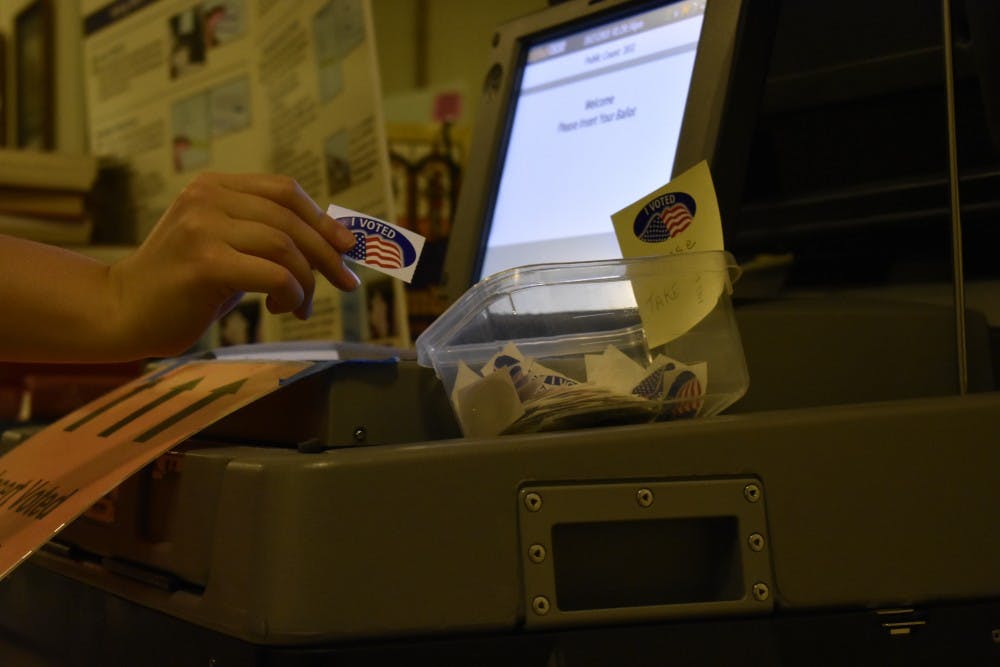If you’re not affiliated with a party, you’ll be able to choose the Republican, Democratic or Libertarian ballot. You could also request the nonpartisan ballot if your county — like Orange County — offers it.
Who will I be voting for?
Lots of people.
At the polls, your ballot will contain the names of candidates seeking nominations for elections occurring at both national and state-wide levels.
Though the Democratic presidential primary has garnered the most national attention, the Republican presidential primary includes challengers Bill Weld and Joe Walsh.
Aside from the presidential hopefuls, you’ll be voting for candidates seeking a spot in the U.S. House and Senate. For the senate, three Republican candidates will be up against incumbent Sen. Thom Tillis, while five Democrats will vie for a chance to be on the November ballot.
There will also be various primaries impacting state government. The ballot will include candidates for the North Carolina General Assembly along with others running for governor, lieutenant governor and other state executive official roles.
Some counties — including Durham, Forsyth and Wake — will be holding primary elections for municipal roles.
Ultimately, where you vote will determine which races are listed on your ballot. You can find your sample ballot by entering your personal information here.
Where should I go vote?
This depends on the precinct the North Carolina State Board of Elections assigned you to, which occurs when you register to vote or change your address.
If you're registered in Orange County and live on campus, you’ll have the opportunity to vote on campus at the Sonja Haynes Stone Center.
To get the day's news and headlines in your inbox each morning, sign up for our email newsletters.
But, if you’re not registered in Orange County or live in off-campus housing, you can check your voter verification card to locate your assigned polling place or search for your appropriate polling place here.
What time should I get to the polls?
If you’re voting on Election Day, plan to arrive at your precinct poll any time between 6:30 a.m. and 7:30 p.m.
What type of ID should I take with me?
None, actually.
Photo IDs are not required to vote in the primary election. As of Dec. 31, 2019, a federal district court blocked North Carolina’s voter photo ID law from being implemented.
What if I have class on March 3 and can’t make it to my assigned polling place?
No problem.
Registered voters have the opportunity to request an absentee ballot until Feb. 25 at 5 p.m. with this form. The county board of elections must receive a mailed, signed copy of the form before the primaries to grant the ballot.
Another option is to participate in one-stop absentee voting, also know as early voting, on Feb. 13 through Feb. 29. By voting early, you can cast your ballot at any early voting site in your county, not just your specific precinct.
Citizens who have not yet registered to vote can also register at any early voting site before filling out their ballot.
A list of early voting sites can be found here.
When’s the deadline to register to vote?
If you plan to vote on Election Day, you have until Feb. 7 to register. But if you miss that deadline, you can still register at an early voting site by confirming your citizenship and filling out a registration application. You’ll also have to prove your residence by showing your current name and current address on either a driver’s license, bank statement or utility bill among other accepted forms found here.
Students interested in registering to vote in Orange County at an early voting site can use their UNC One Card along with a document proving campus residence.
Does my vote even matter?
The Bipartisan Policy Center released a study in 2018, which focused on the primary election turnout for the 2018 U.S. midterm elections. The researchers found that North Carolina — with a 12 percent participation rate — was among five states with the lowest voter turnout nationally.
Diana Bangera is a sophomore nursing major. She said she and her family moved to North Carolina in 2005 and have been legal residents since then. But without citizenship, Bangera said she recognizes the importance of voting even more.
“I feel pretty aware of how the primary election works and not being able to have a say voting-wise has been frustrating for my family,” Bangera said. “So I think it’s really important for the people who do have that privilege to utilize that and speak up.”
She said many individuals from her Indian community are not very involved with politics.
“I think it’s important to be representative of your own voice, though, because everyone offers something different,” Bangera said. “Voting reminds me that even a small thing is so much bigger than any one of us, and it’s important to not stay idle.”
Do you have more questions? Come to the DTH listening session on Feb. 9 at 4 p.m., more details to come.
@evelyaforte
university@dailytarheel.com




